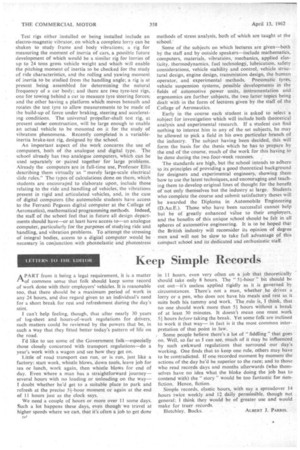Keep Simple Records
Page 54

If you've noticed an error in this article please click here to report it so we can fix it.
APART from it being a legal requirement, it is a matter 1-1of common sense that folk should keep some record of work done with their employers' vehicles. It is reasonable too, that there should be a maximum period of work in any 24 hours., and due regard given to an individual's need for a short break for rest and refreshment during the day's stint.
I can't help feeling, though, that after nearly 30 years of log-sheet and hours-of-work regulations for drivers, such matters could be reviewed by the powers that be, in such a way that they fitted better today's pattern of life on the road.
I'd like to see some of the Government folk—especially those closely concerned with transport regulations—do a year's work with a wagon and see how they get on.
Little of road transport can run, or is run, just like a factory: start work, whistle blows, down tools, leave job for tea or lunch, work again, then whistle blows for end of day. Even where a man has a straightforward journey— several hours with no loading or unloading on the way— I doubt whether he'd get to a suitable place to park and refresh at the precise 51-hour moment or again at the end of 11 hours just as the clock says.
We need a couple of hours or more over 11 some days. Such a lot happens these days, even though we travel at higher speeds where we can, that it's often a job to get done in 11 hours, even very often on a job that theoretically should take only 8 hours. The " 51-hour " bit should be cut out---it's useless applied rigidly as it is governed by circumstances. There's not a man, whether he drives a lorry or a pen, who does not have his meals and rest as it suits both his tummy and work. The ,rule is, I think, that no one should work more than 51 hours without a break of at least 30 minutes. It doesn't mean one must work 51hours before taking the break. Yet some folk are inclined to work it that way— in fact is it the most common interpretation of that point in law.
, Some people believe there's a lot of " fiddling " that goes on. Well, so far as I can see, much of it may be influenced by such awkward regulations that surround our day's working. One finds that to keep one rule, others may have to be contradicted. If one recorded moment by moment the actions of the day he'd be superior to the race; and to those who read records days and months afterwards who themselves have no idea what the bloke doing the job has to contend with) the " story " would be too fantastic for nonfiction. Hence, fiction.
Simple records, elastic hours, with say a spreadover 14 hours twice weekly and 12 daily permissible, though not general; I think they would be of greater use and would make for truer records.
Bletchley, Bucks. ALBERT J. PARRIS.




















































































































